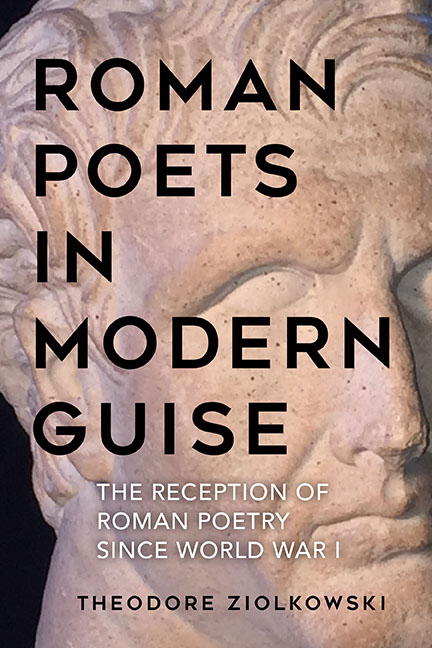6 - Ovidian Waves
Published online by Cambridge University Press: 21 October 2020
Summary
While Lucretius, Catullus, Propertius, and their contemporaries stood in an often uneasy relationship with the government and society of the declining Republic, Virgil and Horace made mutually beneficial accommodations with the reign of Augustus. With the following generations, as the Principate deteriorated into tyrannical dictatorships, the tensions between free-thinking poets and their societies became more severe, often resulting in exile or commanded suicides. But precisely these tensions made these poets attractive to writers in America and Europe at times of social turmoil.
Over the centuries “Ovidian Ages” have alternated in an almost predictable regularity with the vogue of Virgil. Robert Graves observed that “whenever a golden age of stable government, full churches, and expanding wealth dawns among the Western nations, Virgil always returns to supreme favour.” Conversely, in times of political and cultural upheaval Ovid, who has been widely recognized as the “ur-exile” and whose works exemplify change and metamorphosis, has offered comfort to readers and models to writers. In the twentieth century this alternation has proceeded in three principal waves.
Interbellum Ovid
The century began under the aegis of Virgil, the nineteenth centenary of whose birth had been celebrated to international acclaim in 1882. Yet even before World War I shattered the confidence and splendor of the grand era of imperialism, which paid lip service to Virgilian pietas and amor patriae, doubts and uncertainties were evident, conveyed by images from Ovid. In 1912 Richard Strauss's opera Ariadne auf Naxos, with its libretto by Hugo von Hofmannsthal, and a series of eight paintings by Giorgio de Chirico, presented Ovid's tragic heroine (Metamorphoses 8.172–82) as a symbol of the loneliness, abandonment, and exile that lay in store for a new generation.
Perhaps the earliest advocate of Ovid was Ezra Pound, himself a voluntary exile from the United States. From at least The Spirit of Romance (1910), where he described Ovid as “urbane,” “a Roman of the city,” and a skeptical poet for a skeptical age, down through his early Cantos, where Ovid is frequently cited, Pound was a tireless promoter of the Roman poet, whose society, he felt, faced the same problems as did the modern world. At the expense of Virgil, whom he considered a second-rate “Tennysonian,” Pound in his letters incessantly urged Ovid upon his friends as a poet second only to Homer.
- Type
- Chapter
- Information
- Roman Poets in Modern GuiseThe Reception of Roman Poetry since World War I, pp. 157 - 173Publisher: Boydell & BrewerPrint publication year: 2020



